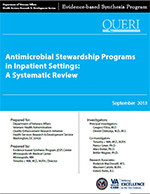
Principal Investigators:
Gregory Filice, MD;
Dimitri Drekonja, MD, MS
Co-Investigators:
Timothy J. Wilt, MD, MPH;
Nancy Greer, PhD;
Mary Butler, PhD;
Brittin Wagner, PhD
Download PDF: Complete Report, Executive Summary, Report, Appendices
It is estimated that in 2009, more than 3 million kilograms of antimicrobials were administered to human patients in the United States. While the life-saving benefits of antimicrobials are indisputable, the consequences of use and misuse must also be considered. Major concerns related to the use of antimicrobials are increasing resistance, higher incidence of Clostridium difficile (C. difficile) infection (CDI) and increased healthcare costs (including costs related to adverse events associated with antimicrobial use).
While much of the discussion focuses on overuse, there is also evidence of adverse outcomes associated with inadequate antimicrobial therapy. Antimicrobial stewardship programs (ASPs) are a focused effort by a health care system, a hospital, or a portion of a hospital (e.g., an intensive care unit) to optimize the use of antimicrobial agents. The goals of an ASP are to improve patient outcomes, reduce adverse consequences, reduce or prevent an increase in antimicrobial resistance, and deliver cost-effective therapy. The emphasis is on appropriate selection, dosing, route, and duration of antimicrobial therapy.
The purpose of this review is to synthesize the evidence about the effectiveness of antimicrobial stewardship programs implemented in hospital settings. We focus on ASPs including one or more of the following components: prospective audit and feedback, formulary restriction, preauthorization of prescriptions, guidelines for prescribing and/or modifying therapy, computerized decision support, or laboratory testing. The topic was nominated by Matthew Goetz, MD, Chief, Infectious Diseases, VA Greater Los Angeles Healthcare System, on behalf of the VA Antimicrobial Stewardship Task Force, and is intended to provide a summary of the evidence on inpatient antimicrobial stewardship programs to guide clinical practice and policy within the Veterans Healthcare System. We developed the following key questions with input from a technical expert panel.
We addressed the following key questions:
Key Question 1:
What is the effectiveness of inpatient antimicrobial stewardship programs on
the following:
a.) Primary Outcome: Patient centered outcomes (30 day readmission, mortality, Clostridium
difficile infection, length of stay, adverse effects)
b.) Secondary Outcomes: 1) Antimicrobial prescribing (timing, use, selection, dose, route,
duration); 2) Microbial outcomes (institutional resistance, resistance in study population);
3) Costs (healthcare, program, opportunity, drug)
Key Question 2: What are the key intervention components associated with effective inpatient antimicrobial stewardship (e.g., persuasive, restrictive, structural, or combination intervention; personnel mix; level of support)?
Key Question 3: Does effectiveness vary by: a) hospital setting (rural, urban, academic, VA, non-VA); or b) suspected patient condition?
Key Question 4: What are the harms of inpatient antimicrobial stewardship programs?
Key Question 5: Within the included studies, what are the barriers to implementation, sustainability, and scalability of inpatient antimicrobial stewardship programs?